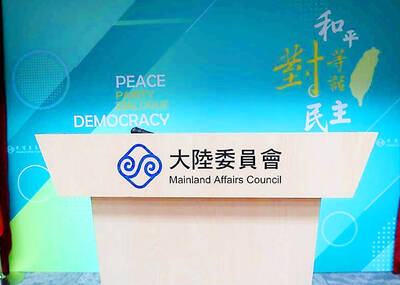China would attempt to disrupt elections in the US, South Korea and India this year with artificial intelligence (AI)-generated content after making a dry run with the presidential poll in Taiwan, Microsoft Corp has said.
The US tech firm expects Chinese state-backed cybergroups to target high-profile elections this year, with North Korea also involved, a report published on Friday by the company’s threat intelligence team showed.
“As populations in India, South Korea and the United States head to the polls, we are likely to see Chinese cyber and influence actors, and to some extent North Korean cyberactors, work toward targeting these elections,” the report reads.

Photo: Reuters
“At a minimum,” China would create and distribute through social media AI-generated content that “benefits their positions in these high-profile elections,” Microsoft said.
The company added that the impact of AI-made content was minor, but warned that could change.
“While the impact of such content in swaying audiences remains low, China’s increasing experimentation in augmenting memes, videos and audio will continue — and may prove effective down the line,” Microsoft said.
China had already attempted an AI-generated disinformation campaign in the Taiwanese presidential and legislative elections in January, the report said.
That was the first time it had seen a state-backed entity using AI-made content in a bid to influence a foreign election, it added.
A Beijing-backed group called Storm 1376, also known as Spamouflage or Dragonbridge, was highly active during the Taiwanese election, the report said.
Its attempts to influence the outcome included posting fake audio on YouTube of presidential candidate Terry Gou (郭台銘) — the Hon Hai Precision Industry Co founder who bowed out in November last year — endorsing another candidate, it said.
That clip was “likely AI generated,” Microsoft said.
YouTube removed the content before it reached many users.
The Beijing-backed group pushed a series of AI-generated memes about now-president-elect William Lai — a pro-sovereignty candidate opposed by Beijing — that leveled baseless claims against the vice president accusing him of embezzling state funds.
There was also an increased use of AI-generated TV news anchors, a tactic that has also been used by Iran, with an “anchor” making unsubstantiated claims about Lai’s private life including fathering illegitimate children, the report said.
The news anchors were created by the CapCut tool, developed by the Chinese company ByteDance Ltd (字節跳動), the owner of TikTok, Microsoft said.
Chinese groups continue to mount influence campaigns in the US, with Beijing-backed actors using social media accounts to pose “divisive questions” and attempt to understand issues dividing US voters, it said.
“This could be to gather intelligence and precision on key voting demographics ahead of the US presidential election,” Microsoft wrote in a blog post accompanying the report.

Taiwan Semiconductor Manufacturing Co (TSMC, 台積電) on Wednesday said that a new chip manufacturing technology called “A16” is to enter production in the second half of 2026, setting up a showdown with longtime rival Intel over who can make the fastest chips. TSMC, the world’s biggest contract manufacturer of advanced computing chips and a key supplier to Nvidia and Apple, announced the news at a conference in Santa Clara, California, where TSMC executives said that makers of artificial intelligence (AI) chips will likely be the first adopters of the technology rather than a smartphone maker. Analysts said that the technologies announced on

A total of 41 US military personnel were stationed in Taiwan as of December last year, a US congressional report said on Friday last week ahead of Tuesday’s passage of an aid package that included US$8 billion for Taiwan. The Congressional Research Service in a report titled Taiwan Defense Issues for Congress said that according to the US Department of Defense’s Defense Manpower Data Center, 41 US military personnel were assigned for duty in Taiwan. Although the normalization of relations with the People’s Republic of China (PRC) in 1979 included a vow to withdraw a military presence from Taiwan, “observers have indicated

NO RECIPROCITY: Taipei has called for cross-strait group travel to resume fully, but Beijing is only allowing people from its Fujian Province to travel to Matsu, the MAC said The Mainland Affairs Council (MAC) yesterday criticized an announcement by the Chinese Ministry of Culture and Tourism that it would lift a travel ban to Taiwan only for residents of China’s Fujian Province, saying that the policy does not meet the principles of reciprocity and openness. Chinese Deputy Minister of Culture and Tourism Rao Quan (饒權) yesterday morning told a delegation of Chinese Nationalist Party (KMT) lawmakers in a meeting in Beijing that the ministry would first allow Fujian residents to visit Lienchiang County (Matsu), adding that they would be able to travel to Taiwan proper directly once express ferry

CALL FOR DIALOGUE: The president-elect urged Beijing to engage with Taiwan’s ‘democratically elected and legitimate government’ to promote peace President-elect William Lai (賴清德) yesterday named the new heads of security and cross-strait affairs to take office after his inauguration on May 20, including National Security Council (NSC) Secretary-General Wellington Koo (顧立雄) to be the new defense minister and former Taichung mayor Lin Chia-lung (林佳龍) as minister of foreign affairs. While Koo is to head the Ministry of National Defense and presidential aide Lin is to take over as minister of foreign affairs, Tsai Ming-yen (蔡明彥) would be retained as the nation’s intelligence chief, continuing to serve as director-general of the National Security Bureau, Lai told a news conference in Taipei. Koo,